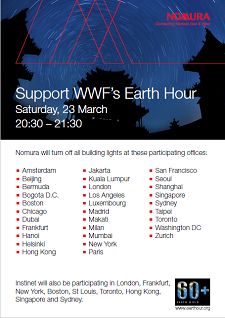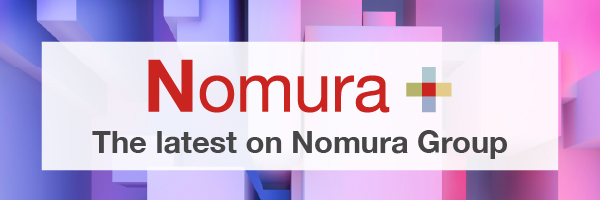Nomura Group, as a multinational corporate group with offices around the world, is making every effort to help resolve climate change issues through our business activities and reduce the impact of our business activities on the natural environment.
We collect and disclose environmental information, and since FY2009/10, we have added third-party assurance verifications to ensure the reliability of this information. Moreover, we recognize the importance of disclosing climate-related financial information and have been supporting the Task Force on Climate-related Financial Disclosures (TCFD) since FY2018/19. We are also working to expand disclosures based on the TCFD framework. In each region, based on the regulations established by local governments, we prepare plans for addressing global warming and submit these to the government authorities. In September 2021, we announced our commitment to achieving "net zero" greenhouse gas emissions for our own operations by FY2030/31, in order to support the speedy decarbonization of the economy.
We are reducing energy consumption at Group-owned buildings under an ongoing program of replacing electrical equipment and air-conditioning equipment with energy-saving models and managing these with greater efficiency.
Nomura Group is committed to expanding our global use of renewable energy, guided by a policy to procure electricity that aligns with GHG Protocol standards and RE100 technical requirements.
In Japan, we started purchasing Green Power Certificates in 2006, and have since been transitioning our key European locations to renewable electricity. As we work toward our 2030 goals, we are progressively shifting to renewable energy, prioritizing regions with established supply infrastructures, and have already met our interim objectives. The "Renewable Energy Adoption Ratio" in the table above represents the proportion of electricity obtained through renewable energy sources, such as renewable power menus, Green Power Certificates, and Non-fossil Fuel Certificates, relative to the total electricity consumption of our group.
In each region, based on the regulations established by local governments, we prepare plans for dealing with global warming and submit these to the government authorities.
Under its Environmental Security Regulations, the Tokyo metropolitan government has prepared and submitted this report since fiscal 2010 based on the System for Reporting on Climate Change Activities of Small and Medium-Sized Companies, which covers stipulated business establishments within the City of Tokyo.
The Streamlined Energy & Carbon Reporting was implemented on 1st April 2019 in the UK. The introduction of SECR coincides with the end of the Carbon Reduction Commitment Energy Efficiency Scheme (CRC), with Nomura completing their final year of CRC reporting in 2019 following seven years of successfully delivering compliance.
Nomura as a qualifying company is required to report on their UK GHG emissions with intensity metrics and any energy efficiency initiatives as part of their annual Director’s Report. Nomura is well positioned to meet and deliver on these annual reporting requirements with its existing robust data collection and reporting processes, and successfully undergo any external auditing requirements.
- The United Kingdom Government introduced the SECR Scheme in 2019. The scheme mandates the reporting of carbon emissions and energy use in the business premises of qualifying companies
Article 8 of the EU Energy Efficiency Directive came into force in 2014 which mandates all qualifying large organizations to undertake energy audits every 4 years to ensure understanding of their own energy use and identify any cost effective energy saving measures.
ESOS was developed by the UK government in response to Article 8 of the EU Energy Efficiency Directive and came into force in July 2014.
Energy audits have been completed at other European Nomura sites to ensure compliance is met and energy efficiency improvement opportunities are identified and implemented where possible.
Approximately 99.9% of company vehicles that we lease in Japan are defined by the Ministry of Land, Infrastructure and Transport as low-emission models. All newly introduced vehicles in FY2019/20 were low-emission models. We have also introduced fuel cell vehicles since fiscal 2014. We will deploy more such low-emission vehicles as existing leases expire.
In 2019, we introduced telematics in our leased vehicles. Telematics is an IoT solution that enables the acquisition of various data using communication devices installed in automobiles. Using this system, we can collect information on the dangerous driving situations in our fleet vehicles and their fuel efficiencies, and then we can use the system to promote eco-driving and safe driving. It is also possible to check the operating status of each leased vehicle and make effective use of the vehicle.
Furthermore, we are promoting a remote work via the effective use of various IT equipment and teleconference, and less business travels, (reducing travels by trains, vehicles, and airplanes), and therefore, we are consequently reducing the environmental impact.

Nomura Group offices around the world participated in the World Wildlife Fund's Earth Hour 2024 on March 23.
Lights were turned off for one hour starting at 8:30 p.m., local time, while employees were also encouraged to turn off unnecessary lights at home and in the office, allowing the entire group to share a renewed awareness of the importance of saving energy.
Nomura Group supports the "Declaration of Biodiversity by Keidanren and Action Policy". This Declaration and Action Policy aim to harmonize natural cyclical functions and business activities, and urges companies to do even more to promote business management that contributes to solving issues related to biodiversity and climate change.
In addition, we also support NGOs and NPOs involved in nature and biodiversity conservation both domestically and internationally via the Keidanren Nature Conservation Fund.

We keep beehives on the roof of our office in London. Honey bees are vital to sustaining our ecosystem as they pollinate the majority of the fruits, vegetables and crops that end up on our plates. Without the honey bee, our environment could change dramatically. The plight of the honey bee illustrates perfectly the interconnectivity of living things.
Through the breeding of honey bees, our employees learn about the ecosystem around the London office and connect with nature. Through these types of activities, we aim to raise our awareness of biodiversity.


